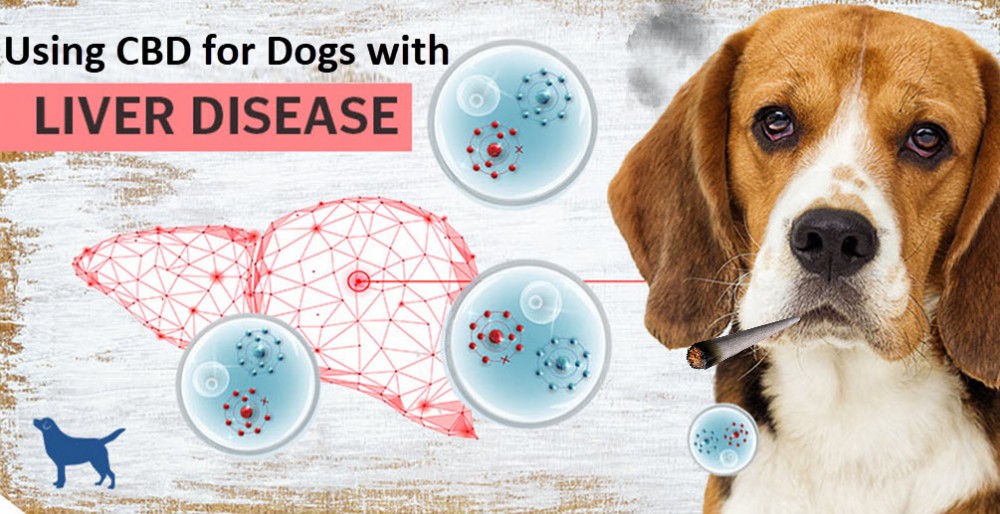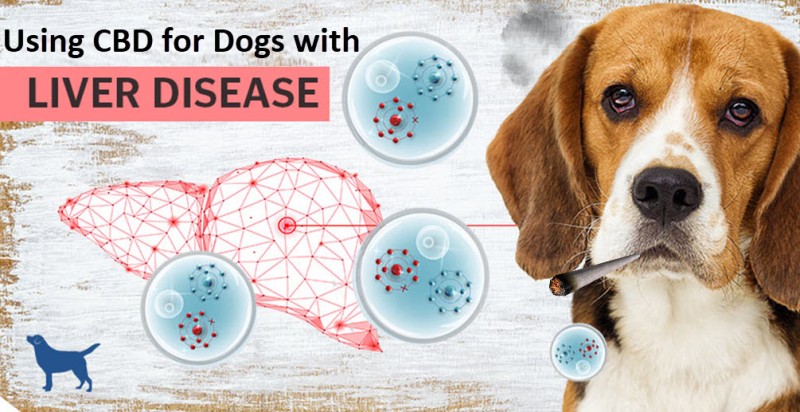Using CBD to Treat Liver Disease in Dogs

The rising popularity of CBD products for dogs has inspired many pet owners to get on board with giving the supplement to their companion animals for a wide variety of conditions. These include epilepsy and seizures, cancer, pain, inflammation, joint and bone health, diabetes, and arthritis. CBD also serves as an immune system regulator, a neuro-protector, antibacterial and post surgical assistant to healing. As such, it is becoming a prized remedy for supporting pet health.
Studies on the benefits of CBD for dogs are few and are just beginning to appear in larger numbers. These studies have focused primarily on the use of CBD for treating arthritis and epilepsy in dogs, as well as for canine pain relief. There is a group of disorders, however, for which CBD may be or great benefit for dogs, and that is the category of liver disease. There are no long-term studies on the efficacy of CBD for treating these conditions, but many holistic vets feel it has an important role to play in this area.
Types of Liver Disease in Dogs
The liver is the second largest organ in a dog’s body, the largest being the skin. It plays a critical part in metabolism and breaking down toxins, in all being responsible for some 1,500 different biological processes. The liver filters the blood, produces bile to break down fats, produces proteins that are responsible for clotting, regulates blood levels of amino acids, stores iron that is used in the processing of hemoglobin, helps the animal to resist infections by filtering bacteria from the bloodstream, and much more. When the liver is compromised, the result can be a variety of serious health issues for the dog.
The primary challenges to canine liver health are:
1. Infections
2. Toxic plants and chemicals
3. Pharmaceuticals
4. Cancer and tumors
5. Diet
6. Over-vaccination
7. Congenital conditions
Let’s look at each of these individually.
Infection
Fungi, parasites, viruses (such as Adenovirus)and bacterial infections (such as Leptospirosis) can invade a dog’s body, infect the liver, and cause extensive damage. Leptospirosis -- one of the most common infections -- is spread to dogs via contact with wildlife such as rodents that carry the bacteria. The Leptospirosis spirochetes invade the body, spreading to and reproducing in the liver, kidneys, eyes, central nervous system, and reproductive system. The most obvious indication of this condition is fever, which often resolves upon the development of antibodies produced by the animal’s immune system. However, if the immune system is compromised, it is difficult for the dog’s body to resist the infection and the result can be fatal.
Toxic Plants and Chemicals
The liver is the first line of defense against environmental toxins. These toxins are ubiquitous in the homes and gardens of pet owners in the form of common plants that are toxic to dogs. These include aloe, begonia, daffodil, castor bean, sago palm, autumn crocus, lilies, tomato leaves, and many others. Foods such as raisins or chocolate are well-known canine hazards. And exposure to household cleaning products and a variety of other chemicals can cause poisoning and liver damage.
Pharmaceuticals
Drugs, even those prescribed by veterinarians, can be harmful to dogs. Pharmaceuticals account for much of the poor health seen in animals treated via conventional medical means. Prednisone, phenobarbital, and tetracycline are among the commonly administered medications that can cause canine hepatic disease.
Cancer and tumors
Liver cancer in dogs can be caused by exposure to pesticides, herbicides, or other environmental chemicals. It can also be the result of molds found in common pet food additives, diabetes, long-term use of painkillers, parasites, and untreated heartworms, among other causes. The cancer may spread to other vital organs if not treated.
Diet
Commercial pet food is often contaminated with aflatoxins, which are a major contributor to poor health in companion animals. Aflatoxins are a type of mycotoxin that come from the Aspergillus fungus and can not be killed by high temperatures, so even cooked foods are likely to contain them. They are found in foods such as corn, wheat, soybeans, peanuts, Brazil nuts, rice and walnuts. Aflatoxins bind with DNA and cause cell mutations which lead to cancer. Low cost kibble is most likely to contain these substances, but even premium quality brands have been found to harbor aflatoxins. Chronic exposure to aflatoxins has been associated with increased risk of liver cancer (https://www.ncbi.nlm.nih.gov/pmc/articles/PMC1314947/).
Over-vaccination
Vaccination has an important role to play in maintaining a dog’s health. However, there are risks associated with over-vaccination. Finding the proper balance between core vaccines (those that all dogs should receive to be protected against serious diseases such as distemper, adenovirus, parovirus, and rabies) and non-core vaccines (those given based on individual need). Vaccination schedules should depend on lifestyle and exposure factors, and is ultimately a decision to be made by the individual pet owner in consultation with their veterinarian. Many holistic vets feel that over-vaccination can lead to chronic illness in pets, including certain types of cancer originating from vaccination-caused inflammation.
Congenital Conditions
A congenital liver shunt is an abnormal but common condition in dogs. A shunt results from a birth defect known as PSS or portosystemic shunt. It is an abnormal blood vessel that connects the digestive tract with the circulatory system, bypassing the liver and preventing it from filtering proteins that need to be digested and absorbed in the gut. As a result, proteins are diverted into the bloodstream instead of being processed through the liver. This condition results in a variety of health problems including poor growth, low appetite, weight loss, vomiting, diarrhea and neurological problems.
How Can CBD Help Treat Liver Issues in Dogs?
CBD has an important role to play in healing liver disease. It can be part of a targeted treatment approach that includes diet, nutritional supplements, veterinary supervision and pharmaceuticals if indicated. Here are a few primary ways that CBD can help dogs being treated for liver conditions.
· Inhibits tumor growth
· Easily metabolized
· No harmful side effects
· Decreases side effects of conventional cancer treatments
· Reduces pain and inflammation
· Sleep aid
· Maintains healthy appetite
· Treats symptoms such as nausea, vomiting, diarrhea, vertigo, thus making dog more comfortable and improving quality of life.
When Should CBD Not Be Used for Canine Liver Disease?
There are two areas in which using CBD to treat liver disease comes with caveats. One is congenital liver shunts. Dr. Michael Dym, DVM (http://doctordym.com) says that when treating these conditions his focus is on cutting down on the workload for the liver. This includes switching to a high quality low protein diet and using supplements such as SAMe and milk thistle, rather than using CBD. He’s hesitant about using supplements with all liver conditions, but particularly with congenital issues. “We don’t really know the effects,” he says. He has no hesitation, however, about using CBD for cancer, toxicity, infection, and problems caused by diet and over-vaccination.
The other time to be cautious is when an animal is on pharmaceuticals. Cytochrome P450 is a family of enzymes that play a key role in the metabolism of medications, including both veterinary drugs and CBD. As a consequence, they could interfere with one another’s effectiveness. Dr. Dym says that “they don’t actually neutralize each other, but [given] the fact that [both] are metabolized with the liver Cytochrome P450 system, we just have to be mindful when the liver is chronically compromised.” He may use slightly lower doses of CBD in these cases while being careful to support the liver with appropriate diet and nutrition and closelymonitor the dog..
The Big Picture: CBD as a Treatment Option For Your Dog
CBD offers enormous potential benefits for dogs with liver conditions and should not be overlooked as a treatment option. A good holistically oriented vet will use a comprehensive approach including dietary and nutritional support while conducting regular lab tests to track the animal’s progress.
A reputable holistic vet will also take great care to select high-quality CBD brands -- carefully sourced, organically grown, and rigorously tested -- to use in their practice. Choose a good vet who does their research, and the rest of the picture will be easier to sort out. And a good prognosis for your pup will be the most likely result.
Author Loren Freed
DOGS, CBD, AND LIVERS, READ MORE...
HOW CBD OIL CAN HELP DOGS WITH THESE 3 THINGS, CLICK HERE.








